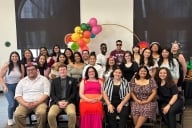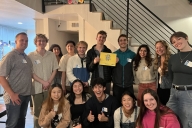You have /5 articles left.
Sign up for a free account or log in.
Students at Rhodes College are collaborating to create the first-ever newspaper for the homeless created by (non-homeless) students.
This month will see the launch of The Bridge, a street paper founded by sophomores James Ekenstedt and Evan Katz, which aims to raise awareness about the plight of the homeless in the Memphis area.
“Last year, James and Evan… approached me about getting involved in the editing and writing process of a new street paper they wanted to start in Memphis,” said Rhodes sophomore Caroline Ponseti, who serves as the Bridge’s managing editor, via e-mail. “After doing some research on the overwhelming success of the street paper concept, the two decided on the spot that they wanted to start a paper.”
“We've been amazed by the amount of support we have received from all the different groups in the Memphis community,” Ekenstedt said.
The first issue of the Bridge will be 12 pages, while future editions will be 16 pages. While the paper will be created by Rhodes students, it will be sold on the street by vendors who are themselves homeless, who will be able to purchase copies for a quarter each and then sell them for a dollar each. The vendors, who will receive training before selling the paper, will be able to keep 100 percent of the profits. According to The Christian Science Monitor, a similar vendor model is used by most street papers.
Ponseti said that the decision to start a paper rather than simply collect donations was “for several reasons. First of all, a major goal for this paper is to bridge the disconnect between the public and the homeless that isolates this disadvantaged community and prolongs the problem of homelessness. We hope that a lot of the content in the paper, which largely contains first-person personal experiences of homelessness, would help the public understand these issues on a personal level.” Indeed, Ponseti said, that hope of a “bridge” was where the paper got its name: “The metaphor of the bridge symbolizes our hope to close the gap between the unsheltered and sheltered populations.”
In addition, Ponseti said, a street paper could be more empowering to the homeless in the long term. “[V]endors of the paper get work experience that will help them get more jobs in the future. As independently contracted vendors, they will be able to gain valuable business experience through their paper sales,” she said. “They are able to choose how many papers they sell, how many hours to work, and where to sell their papers, which will help them develop their business skills.”
“The vendors are also stakeholders in the paper, so it will be a project that they can feel ownership over,” said Paul Garner, organizing coordinator for H.O.P.E. (Homeless Organizing for Power & Equality), an advocacy group based in the mid-South, via e-mail. “Many of our members at H.O.P.E. have also expressed a lot of energy and excitement about the Bridge as a way to get the word out about issues of importance to them.” Garner and H.O.P.E. assisted the staff of the Bridge in outreach and flier distribution.
“This entrepreneurial spirit gives our vendors a sense of pride that doesn't necessarily exist when just receiving a handout,” added Ekenstedt, via e-mail.
Forward thinking on the problem of homelessness is especially needed in Memphis, according to Garner. “[T]here are NO free shelter options in Memphis. The shelters that do exist charge between $6-14 per night, in a city where unemployment is through the roof, and panhandling is a crime,” Garner said. “Most of these shelters are faith-based and apparently think that this exempts them from being compliant with [Americans With Disabilities Act] standards for accessibility. We could spotlight that particular issue, but if we shut them down, there will just be more people on the street at night.”
Ekenstedt said that he thought the project was in keeping with the civic-minded spirit common to Rhodes students. “We hope to be a testament to that involvement and that spirit of giving back to the community," he said.
“Being surrounded by such civically engaged students produces a learning environment where students aren't just interested in social issues but also spend a lot of their time actively trying to change them,” added Ponseti.








